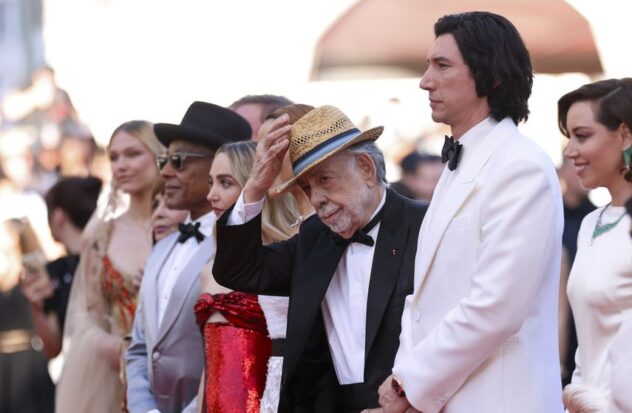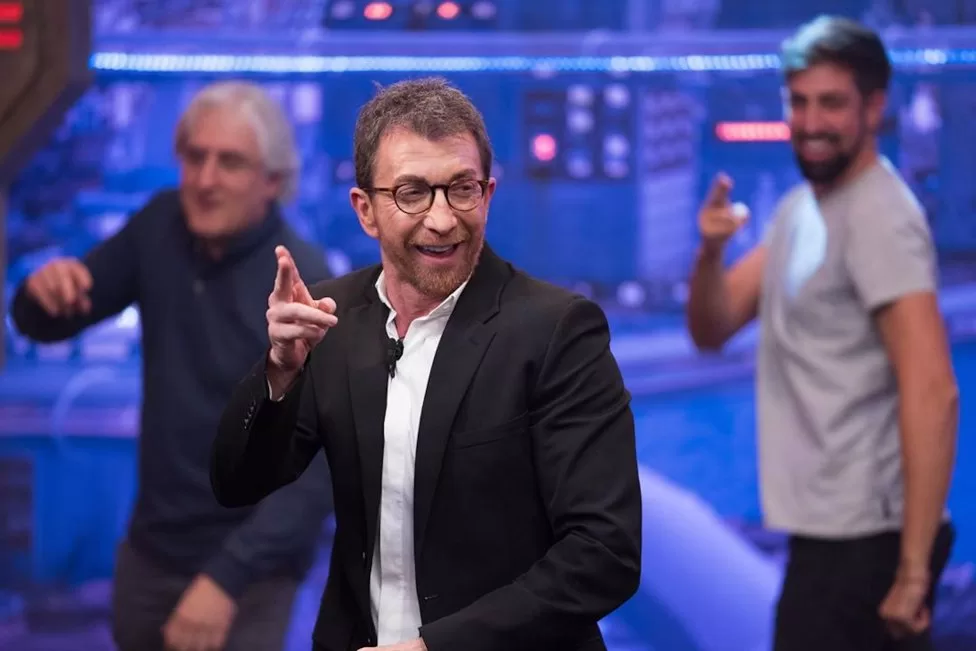“That’s me making this movie,” says Coppola, speaking on the terrace of a hotel in Cannes the day after the premiere of Megalopolis at the French festival. “To all the big guys in the studio, I showed them that I’m free and they’re not. Because they don’t dare jump into the unknown. And I do it. That’s the only way to show that you’re free.”
Coppola pauses and then adds, with a smile. “I do not recommend it”.
megalopolis, Coppola’s first film in 13 years, has been rated in many ways since it premiered at Cannes. Crazy. A disaster. A bold and self-financed bet. What it is, regardless of whether all the strange parts of it work together seamlessly, is a colossal personal statement from one of America’s most visionary filmmakers about having the audacity to be a visionary.
It’s not one small step, but another giant leap for Coppola, 85, who feels so convinced of what Megalopolis encapsulates that he has spent some four decades pursuing it. After the credits rolled on the premiere and the crowd rose to applaud, Coppola took the microphone to extend his message, pleading for a single human family and children.
“My dream would be that this movie could be seen on New Year’s Eve and that people, instead of saying that I’m going to lose weight or that I’m not going to smoke anymore or I’m not going to cheat on my wife, would talk about: It’s the society in which we live the only one available?” Coppola says. “How can we make it better? And if they talk about it, they will. That’s my dream.”
Coppola’s cinema
In Megalopolis, Adam Driver plays Caesar Catiline, a Roman emperor-like figure with the power to stop time in a futuristic New York. He is an inventor who wants to build a new New York metropolis with a material he has created called Megalon. However, in his sensibility, he is more like an artist. Caesar cites “Hamlet,” as well as Emerson, Marcus Aurelius, and Ovid. He is, you can’t help but notice, a bit like Coppola himself.
At the press conference in Cannes, Laurence Fishburne, who co-starred Apocalypse Now (Apocalypse now) by Coppola, recalled that the filmmaker: “has always talked about stopping time.”
“Even before we talked about the movie, I was saying, ‘I can stop time. I’ll show you,'” Fishburne said. “I used to sit and listen to the conversations you had with Eleanor about that.”
Coppola, who relied on a cane or her granddaughter Romy Mars wherever she went in Cannes, is now more aware of her limitations when it comes to time. Eleanor Coppola, his wife, died in April. Megalopolis It is dedicated to her. “Sixty years we were together,” she said, shaking her head. Can you believe it?
Time is the issue Megalopolis, a film that took 40 years to make and which Coppola says he began to think seriously about, he says, after completing The Rainmaker (The power of justice) of 1997.
“During that time, I thought I had worn many styles, Apocalypse It was a wild style, The Godfather “It was very classic, I wondered what my style could be in the future,” says Coppola. “I was curious what kind of film I could make when I grew up. I carried a scrapbook of the things I read. I made a collection of political cartoons. Those tell a whole story in a single image. Ultimately, that led me to make a Roman epic set in modern America.”
The intention
Coppola rewritten Megalopolis many times in the following years. Like Orson Welles, another American filmmaker who experienced unexpectedly enormous success early in his career and who became increasingly experimental as a filmmaker later in his life, Coppola became fascinated with the new possibilities for motion pictures. . He published some of his findings in the 2017 book Live Cinema and its Techniques. Halfway through the projection of Megalopolis In Cannes, a man stood on stage and, into the microphone, addressed a question to Caesar on the screen. It was like an injection of Megalon into the fabric of the film.
Driver was particularly involved in Coppola’s project, and the director considers him an important collaborator. The artist, who sat next to Coppola during the interview, recalled that on the first day of filming, the director told the cast: “We’re not being brave enough.”
“That he made a movie like that at this point in his life seemed like a beautiful thing to me,” says Driver. “He has conviction and is very brave. Why is he doing that at this point in his career and other people aren’t following that example?”
Megalopolis He has had many detractors. After Coppola screened it privately last month in Los Angeles, he was said to have no commercial prospects. Even the film’s defenders concede that Megalopolis He is juggling a lot, not always skillfully, to marry the Roman past with the future of science fiction, libertine daydreaming and ultra-sincerity.
But Coppola did not hesitate, once again, to invest his own money in megalopolis, allocating about 120 million dollars from its wine business to produce it. It’s not the first time he’s done something like that. Coppola invested millions in Apocalypse Now, a film that will also premiere in Cannes amid skepticism and rumors of production problems.
Why does Coppola always have to go all or nothing?
“I have often heard that Francis can only act when he is really confronted,” Coppola says. “I don’t think that’s the case, but maybe so.”
The future of the world
When Coppola and Driver first met to talk about the film several years ago, we talked a lot about babies, Driver says. “They are constantly at work doing complex things, even though it seems like they are doing nothing.”
“Every baby that is being murdered today in Sudan or Palestine, and many of them are being murdered, is a potential Archimedes, a potential Einstein, a potential Mozart,” Coppola says.
Coppola returns to the theme of time. We are not fully understanding our potential to change the world, he says. Although many today are plagued by apocalyptic and ecological anxieties, Coppola sees wonders everywhere. Electricity is not that old, he says. The internet was created in his life. The fusion, Coppola reflects, has enormous possibilities. We are geniuses, he says.
“You never turn on CNN or open the newspaper saying, ‘Human beings are an incredible genius.’ But it’s true. How can you deny it?” Coppola says. “Think about what we can do. A hundred years ago they said that man would never fly. Now we are zooming in. Then I wonder: Why does no one dare say how great we are? There is no problem we face that we are not ingenious enough to solve.
It might be tempting to call “Megalopolis” Coppola’s last testament and see it, imbued with both childlike fascination and an old man’s wisdom, as his wild cinematic farewell. But, as her sister Talia Shire told reporters in Cannes, Coppola always looks forward. He is already writing another script. “Megalopolis” may still be seeking distribution in North America, but, Coppola says, “I’m done with it.”
“I’m creating a new project,” he says, smiling. “It’s going to be unusual, but it’s not going to be on this scale. It’s probably going to be done in England. It’s going to involve music and dancing. I’m a kid who grew up on Broadway. My parents were part of New York theater.”
“It’s going to be fun,” Coppola adds. “I always tell myself: This is going to be fun.”
FUENTE: AP



